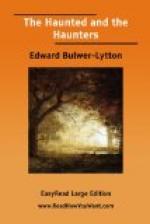Hutcheon had nae will to the wark, but he had stood by Dougal in battle and broil, and he wad not fail him at this pinch; so down the carles sat ower a stoup of brandy, and Hutcheon, who was something of a clerk, would have read a chapter of the Bible; but Dougal would hear naething but a blaud of Davie Lindsay, whilk was the waur preparation.
When midnight came, and the house was quiet as the grave, sure aneugh the silver whistle sounded as sharp and shrill as if Sir Robert was blowing it, and up gat the twa auld serving-men, and tottered into the room where the dead man lay. Hutcheon saw aneugh at the first glance; for there were torches in the room, which showed him the foul fiend, in his ain shape, sitting on the Laird’s coffin! Over he cowped as if he had been dead. He could not tell how lang he lay in a trance at the door, but when he gathered himself, he cried on his neighbour, and getting nae answer, raised the house, when Dougal was found lying dead within twa steps of the bed where his master’s coffin was placed. As for the whistle, it was gaen anes and aye; but mony a time was it heard at the top of the house on the bartizan, and amang the auld chimneys and turrets, where the howlets have their nests. Sir John hushed the matter up, and the funeral passed over without mair bogle-wark.
But when a’ was ower, and the Laird was beginning to settle his affairs, every tenant was called up for his arrears, and my gudesire for the full sum that stood against him in the rental-book. Weel, away he trots to the Castle, to tell his story, and there he is introduced to Sir John, sitting in his father’s chair, in deep mourning, with weepers and hanging cravat, and a small walking rapier by his side, instead of the auld broadsword, that had a hundred-weight of steel about it, what with blade, chape, and basket-hilt. I have heard their communing so often tauld ower, that I almost think I was there mysell, though I couldna be born at the time. (In fact, Alan, my companion mimicked, with a good deal of humour, the flattering, conciliating tone of the tenant’s address, and the hypocritical melancholy of the Laird’s reply. His grandfather, he said, had, while he spoke, his eye fixed on the rental-book, as if it were a mastiff-dog that he was afraid would spring up and bite him.)
“I wuss ye joy, sir, of the head seat, and the white loaf, and the braid lairdship. Your father was a kind man to friends and followers; muckle grace to you, Sir John, to fill his shoon—his boots, I suld say, for he seldom wore shoon, unless it were muils when he had the gout.”
“Ay, Steenie,” quoth the Laird, sighing deeply and putting his napkin to his een, “his was a sudden call, and he will be missed in the country; no time to set his house in order—weel prepared Godward, no doubt, which is the root of the matter—but left us behind a tangled hesp to wind, Steenie.—Hem! hem! We maun go to business, Steenie; much to do, and little time to do it in.”




